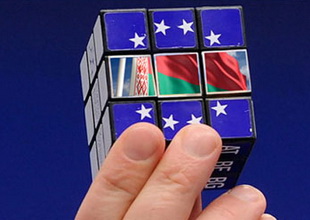Daily Mail: Belarus to seek closer ties with European Union over next five years

Belarus wants to improve trade and commercial ties with the EU to offset a "new wave" of damaging influences on its flagging economy, such as a protracted recession in neighbouring Russia.
Russia's economy after global oil prices slumped and Western countries imposed sanctions over the Ukraine conflict. That has badly ex-Soviet countries like Belarus that rely on exports to Russia and remittances from migrants working there.
Presenting an economic plan for the next five years, the Belarusian government said gross domestic product had contracted 4 percent in the first two months of 2016 and forecast growth of 0.3 percent for the full year.
"A new wave of negative external factors are worsening the chances of a quick economic recovery ... the outlook for economic development in the short term is complex," it said in the five-year plan, posted online.
Belarus's authoritarian president, Aliaksandr Lukashenka, has run the economy along Soviet-style command lines since 1994. But the recent economic crisis has brought about cautious reforms, including a higher retirement age and more flexible rules on the foreign currency market.
In its plan, the government said it would seek to liberalize the business environment further, cut support for loss-making industries, and lessen dependence on the Russian market, which currently accounts for 40 percent of Belarusian exports.
In February, the EU ended five years of sanctions against Belarus, paving the way for freer trade with Belarus and making Belarusian companies eligible for financing from the European Investment Bank and the European Bank for Reconstruction and Development.
It has pushed for democratic change in Belarus but is now shifting its approach to engage rather than isolate its neighbours in central and Eastern Europe. One reason is to counter what it sees as a newly aggressive Russia, which annexed Ukraine's Crimea peninsula in 2014.
"A strengthening of partnership with EU countries is expected with the aim of ensuring stable trade, attracting investment and technologies, carrying out joint industrial and infrastructure projects," the Belarusian government plan said.
The country's main interest rate stands at 24 percent to curb inflation, which rose to 12 percent last year. The central bank projects a gradual fall in inflation to 5 percent and a rate of 8 to 10 percent by 2020, according to the plan.
Belarus has borrowed $2 billion from the Russia-controlled Eurasia fund to service its foreign debt of $12.5 billion. It is also seeking a $3 billion loan from the International Monetary Fund. Over the next five years, the government will try to decrease its reliance on foreign loans, it said.
Originally published at Daily Mail
-
03.01
-
07.10
-
22.09
-
17.08
-
12.08
-
30.09








































